Call for participants: The Power of Data: Collecting and using data to tackle LGBTI homelessness
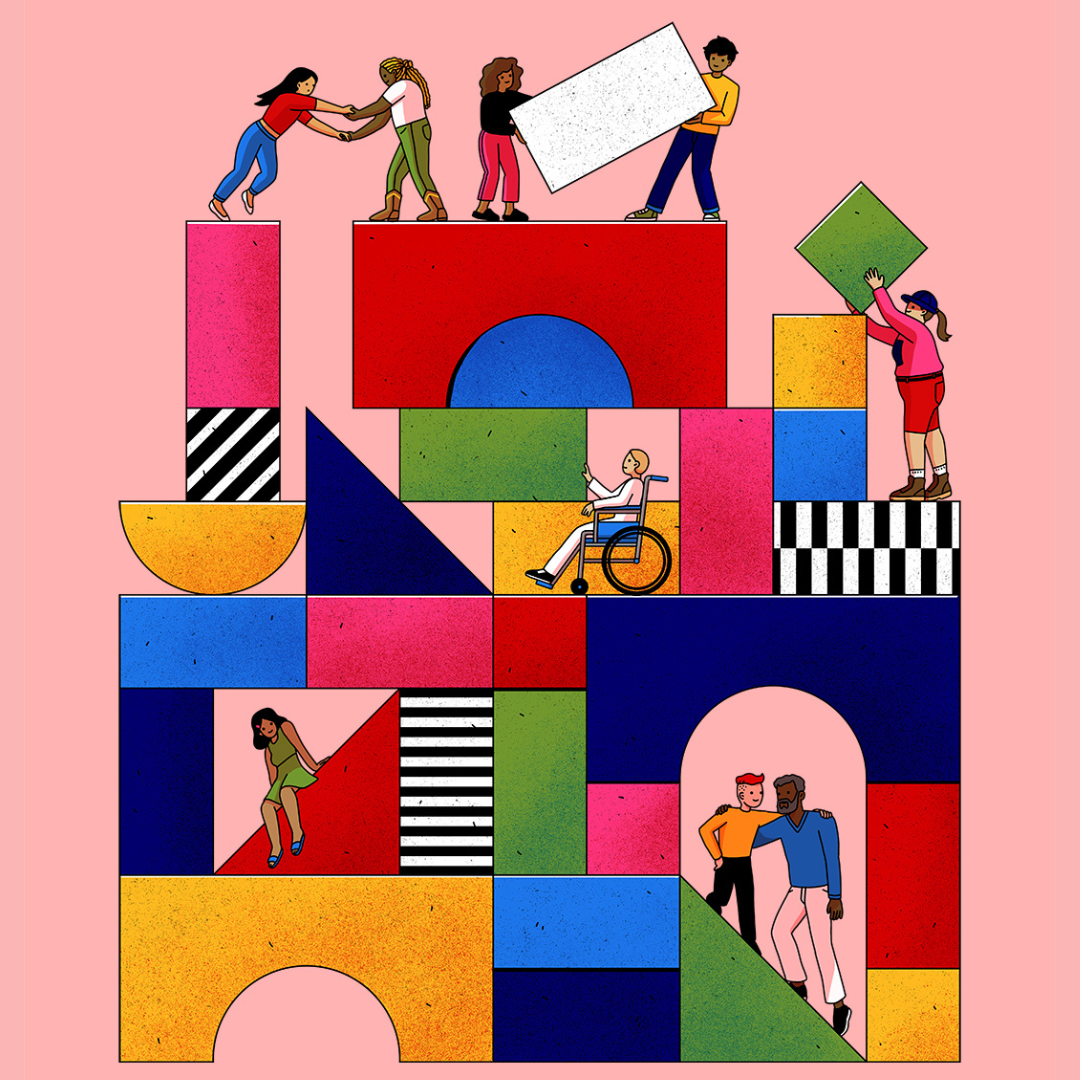
The training is organised by ILGA-Europe and delivered by dedicated researchers from Analysis Group.
It will take place in Brussels on 28 & 29 March 2025, with arrival on 27 March and departure on 30 March.
We know that data is key in the work on LGBTI homelessness. We need it to inform and support advocacy strategies and actions, campaigns, and alliance-building work. At the same time, very few groups can run full-scale research or outsource it.
Yet, organisations often already have access to unique data and evidence through their ongoing work and relationships with communities and allies. Leaning in on what is already in place, data gathering does not need to be a massive and expensive undertaking, and it can be done accessibly and creatively.
This training will equip LGBTI organisations working on LGBTI homelessness with accessible and fit-for-purpose ways to collect data and translate it into advocacy asks.
What you will get from the training
Here is a glimpse at what you can expect over the two days:
- A learning journey, from formulating a research question to translating it into a survey, to understanding the subsequent data and linking it back to your advocacy goals
- Tips and tricks for in-house data analysis and report writing in support of your advocacy goals
- A half-day group session in which you will apply and develop skills in a collaborative setting guided by the trainers
- Networking and mutual learning with a group of 15 activists from LGBTI organisations working on LGBTI homelessness across Europe
- Signposting to further resources and the potential of more follow-up coaching after the training.
The programme will be shared with selected participants closer to the event.
Practical details
- Training dates: 28 & 29 March, 2025
- Travel dates: arrival on 27 March, departure on 30 March. (Departure in the evening of 29 March is also possible provided that you attend the whole event)
- Language: English
- Location: Brussels
- Participation costs are covered by ILGA-Europe (see below)
- Participants are selected through an open competitive call. Number of participants: up to 15.
Who is invited to apply
ILGA-Europe offers this training to LGBTI organisations and groups from across Europe.
For The Power of Data to be an enriching experience, our aim is to bring together a pool of diverse organisations and activists in terms of strategies, profiles, experiences, and geography. Thus, we invite a maximum of one person from an organisation to apply.
The Power of Data training is right for your organisation if:
- It is an LGBTI organisation based and operating in Europe [1];
- Your organisation works on addressing LGBTI homelessness or has concrete plans that require using evidence on LGBTI homelessness, and needs to build its capacity in gathering and analysing data to advance this work;
- Your organisation has a clear vision of how the skills gained during the training will support your work on LGBTI homelessness;
- Your organisation has the capacity and plans to integrate the knowledge and skills gained in the training in its work;
- You, as the delegated participant, are supported by your organisation to dedicate time to the event, attending it in full, and to bring the knowledge back to the team.
As the delegated participant, you do not need to have in-depth skills in research or advocacy, but you need to hold in-depth knowledge of your organisation’s work on LGBTI homelessness and its specific needs and activities around data gathering, and you should be in a position to bring the knowledge from the training back to your organisation to apply it in practice.
[1] For this call Europe is considered to include the following countries: Albania, Andorra, Armenia, Austria, Azerbaijan, Belarus, Belgium, Bosnia and Herzegovina, Bulgaria, Croatia, Cyprus, Czech Republic, Denmark, Estonia, Finland, France, Georgia, Germany, Greece, Hungary, Iceland, Ireland, Italy, Kosovo, Latvia, Liechtenstein, Lithuania, Luxembourg, Malta, Monaco, Montenegro, Netherlands, North Macedonia, Norway, Poland, Portugal, Republic of Moldova, Romania, Russian Federation, San Marino, Serbia, Slovak Republic, Slovenia, Spain, Sweden, Switzerland, Turkey, Ukraine, United Kingdom.
How to apply
Please choose one representative from your organisation to apply.
Submit a completed application form by December 16, 2024, 23:59 (CET) to Nadzeya Husakouskaya at nadzeya@ilga-europe.org. Please indicate the title of the event (The Power of Data) in the subject line.
We will inform you about the outcomes of the selection by January 15, 2025 the latest.
Accessibility note: We aim at ensuring that this event is accessible for everyone in attendance. Please share your accessibility needs in the application form.
Costs of participation
ILGA-Europe covers participation costs for all selected participants, specifically:
- Accommodation in shared rooms with breakfast, with check-in on 27 March and check-out on 30 March;
- Travel costs to and from Brussels. If you are selected, you will need to book your own travel within the approved amount. You will get these costs reimbursed after the event, upon full attendance. If your organisation is working without any funding and unable to pre-book tickets for you, you can be exempt from this requirement. More information will be shared with selected participants;
- Visa costs and compulsory insurance;
- Joint meals: lunches and coffee breaks on 28 and 29 March, and a joint dinner on 28 March;
- Per diem in cash at the event that will cover the rest of the meals and subsistence on 27-30 March.
Can your organisation cover participation costs of its delegate fully or partially? Please mention it in the application form. This will allow us funding more organisations to attend the training in case of high competition. Please note that ability to contribute by cost-sharing is not a selection criterion.
Trainers and organisers
The training is organised by ILGA-Europe and delivered by a group of researchers from Analysis Group, building on our partnership throughout 2023-2024.
ILGA-Europe partnered with Analysis Group to build the movement’s knowledge and skills in gathering and using data in activism on LGBTI homelessness.
Analysis Group is one of the largest international economics consulting firms and a pro-bono partner of ILGA-Europe. From August 2023 to August 2024, Analysis Group joined ILGA-Europe’s No One Left Behind programme on LGBTI homelessness as research experts and coaches, supporting five LGBTI organisations in their research and data gathering projects on LGBTI homelessness.
Trainers:
- Mario Luca (he/him). Mario joined Analysis Group after completing his PhD in economics on extreme right voting and the refugee crisis in Italy. He specialises in empirical analysis for damage estimation and big data and machine learning applied to competition. Mario worked on multiple political projects and is currently coordinating the partnership with ILGA-Europe and AG Pride, the firm’s LGBTI association, in Europe.
- Giovanni Morzenti (he/him) is an economist who specialises in antitrust policy, competition matters and litigation. He volunteered in the epilepsy ward of the Piccolo Cottolengo di Don Orione in Milan and at the Caritas soup kitchen in Bergamo, where homeless people could find a warm place to eat and programs to access secure housing.
- José Alfonso Muñoz-Alvarado (he/him) is an economist consultant with a Ph.D. in Family and Labor Economics. He specialises on applying data analysis to support competition cases and market studies. Alfonso brings a collaborative approach to projects, handling data analysis and working closely with team members across disciplines.
Coordinator: Nadzeya Husakouskaya (they/them), Senior Programmes Officer, ILGA-Europe. Nadzeya leads No One Left Behind programmes at ILGA-Europe focusing on socio-economic justice.
Contacts
If you have any questions about The Power of Data, please reach out to Nadzeya via nadzeya@ilga-europe.org.
Intersections: The LGBTI II Survey – Homelessness Analysis
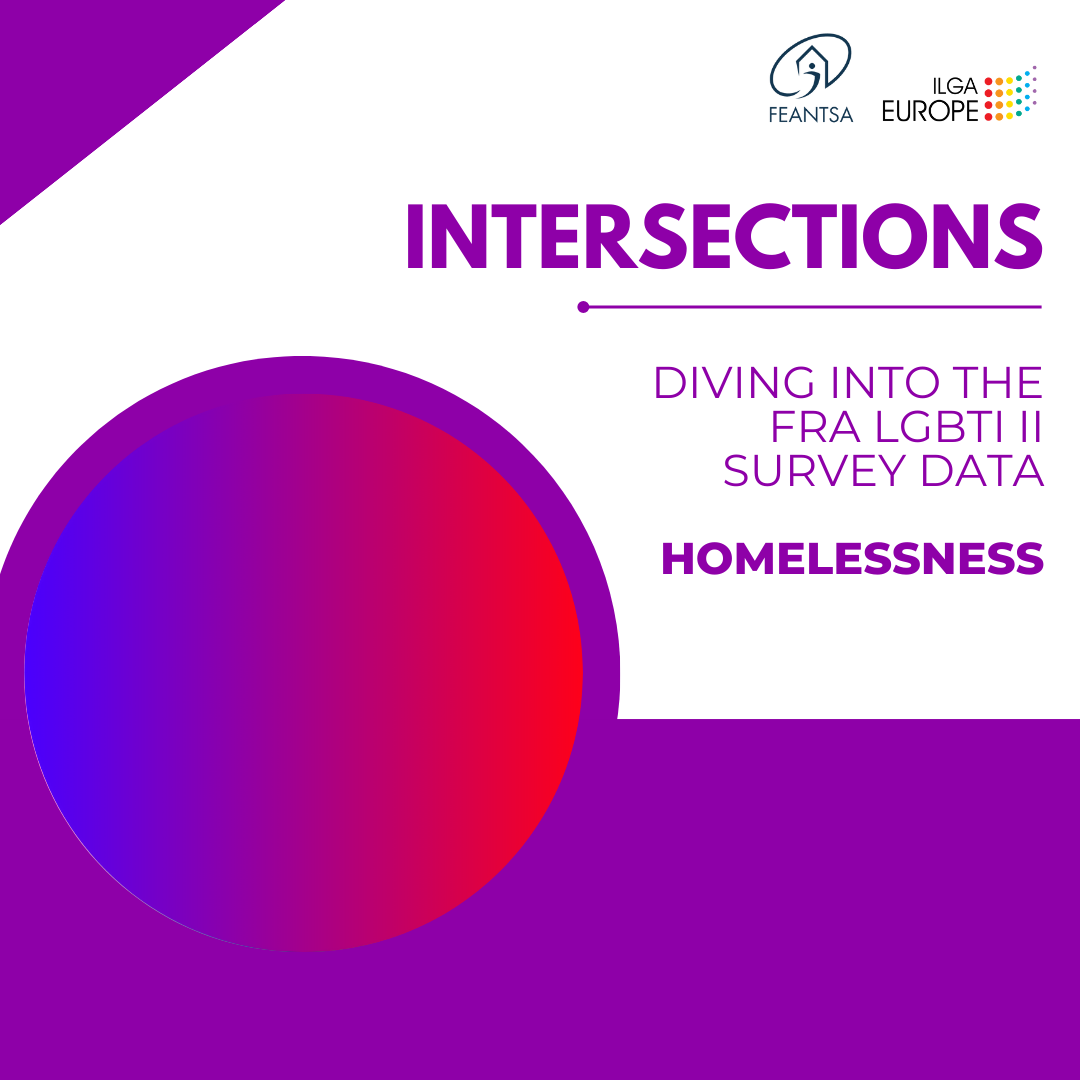
Disaggregated data, which can look deeply into the lived experiences of marginalised people, is a key demand of LGBTI and other human rights groups. With this in mind, over the last year ILGA-Europe have been partnering with a variety of NGOs in the region to analyse the FRA 2019 LGBTI Survey II data and pull out experiences of those experiencing intersectional marginalisation. This work is based on analysis co-commissioned by ILGA-Europe and TGEU.
This briefing analyses the results of the FRA LGBTI Survey II and summarises the relevant data about experiences of homelessness among the LGBTI community.
Call for project proposals: Addressing LGBTI homelessness in the EU
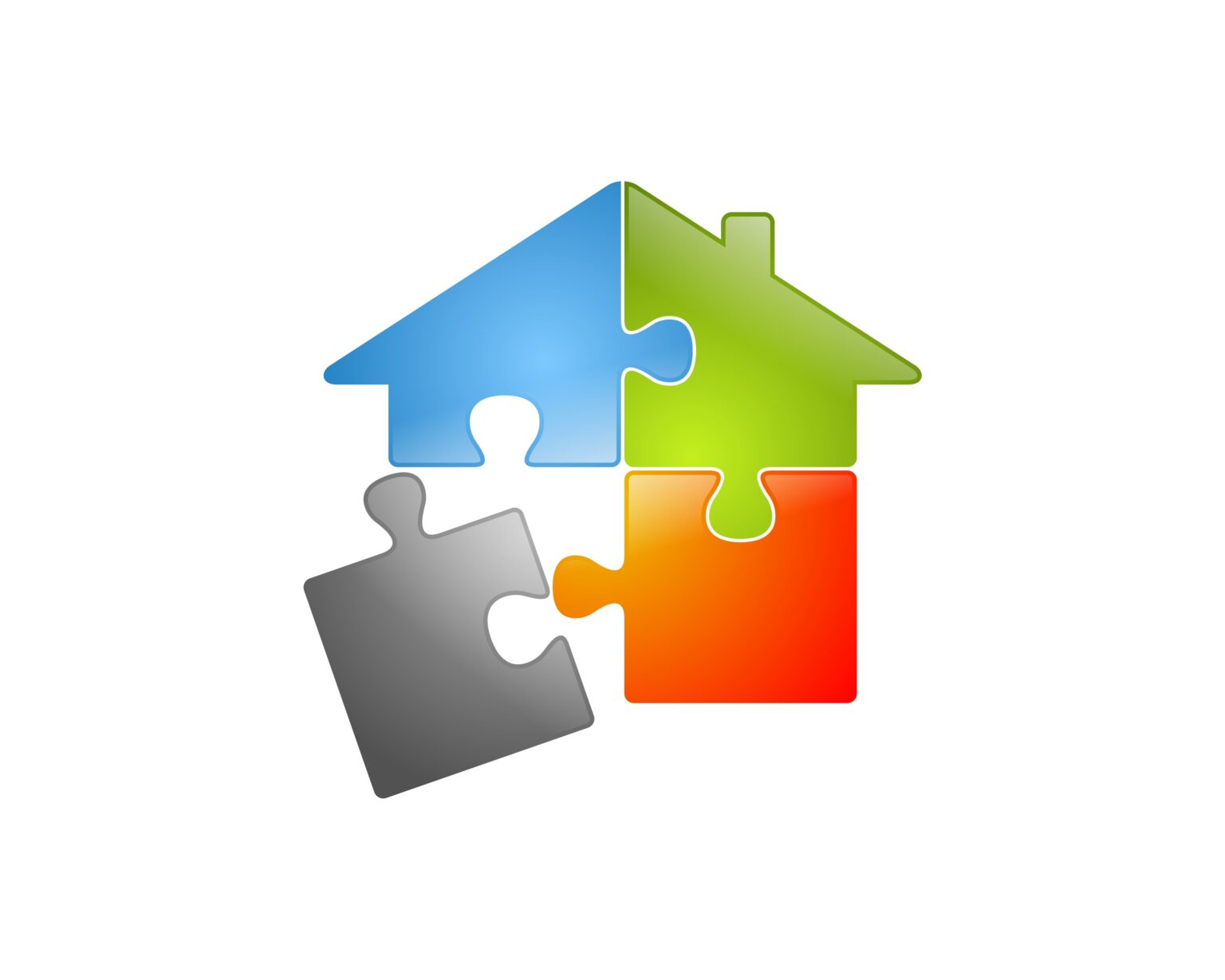
Why we are launching this programme
In 2020, the Fundamental Rights Agency (FRA) released a survey that estimates that one in five members of the LGBTI community in the EU experience homelessness, rising to one in three for trans people and nearly 40% for intersex people. Lack of institutional support, social rejection and identity-related family conflict are amongst the causes for LGBTI homelessness. Undeniably, the pandemic, deepening socio-economic inequalities and the rise of anti-LGBTI rhetoric, anti-trans attacks and the anti-gender movement further exacerbated the situation around homelessness of LGBTI communities, especially with youth.
Yet, LGBTI homelessness remains hidden in Europe. We lack the data and the robust research to fully understand the prevalence, forms and dynamics of LGBTI homelessness in different local contexts in Europe. The lack of knowledge across the European Union leads to a lack of targeted services, absence of national policies specifically addressing the issue of LGBTI homelessness, limited funding, if any, for programmes that include or focus on unhoused LGBTI communities. Often, LGBTI organisations have to step up to support their communities in situations of homelessness where there are gaps in services and when assistance is unavailable or inaccessible.
It is well known that access to housing is a precondition for access to health, employment, education, and social services. This is why we are launching this programme, which will sustain the vital work of understanding the root causes and forms of LGBTI homelessness and advocate for improving access of LGBTI communities to services and housing.
The programme focuses on data collection, advocacy efforts, and/or collaboration between sectors, systems and services in addressing LGBTI homelessness.
Through this programme we want to enhance and advance the work of LGBTI organisations with considerable existing expertise in the field. We believe that having a small group of strong organisations with a strengthened experience in the area of LGBTI homelessness will bring new learnings and insights that can be shared with a wider movement and benefit other organisations who are at the beginning of their work on homelessness in their respective countries.
Structure of the programme
The programme has two interconnected components:
- Financial support for the implementation of a project (20.000 euro per project), AND
- Peer-learning that will bring grantee partners together (on-line) on a regular basis to strengthen the network amongst organisations, enhance possible collaboration, exchange learning, share challenges and solutions.
Important! When you apply for funding under this call, please be aware that you commit to both of the components of this programme.
Aim of the programme
The aim of this programme is to:
- Bring together a small group of 6-7 LGBTI organisations across the European Union that have demonstrated experience in understanding, addressing and/or preventing LGBTI homelessness in their respective countries and/or regions;
- Support, strengthen and advance their work on LGBTI homelessness through a combination of grants and regular peer-learning/networking meetings.
Types of organisations we will support
LGBTI-run organisations that
- are based and work with LGBTI communities in the European Union; AND
- have demonstrated experience, history and track-record of working on LGBTI homelessness.
Non-registered organisations are eligible to apply if they partner with a registered legal entity that is able to receive funds from ILGA-Europe. This entity cannot be a physical person.
Your experience in working with LGBTI homelessness can be through investigating the root causes, analysis of the bigger picture, focusing on prevention and/or short-term solutions (for example, running shelters or providing services). The projects submitted to this programme, however, need to fall within the scope described below, in the section “Types of projects…”. This programme is not designed to support running a shelter and providing direct assistance.
Type of projects we are looking to support
We understand that the most immediate hands-on form of addressing LGBTI homelessness is providing shelter and other services. However, this call is designed to support systemic and sustainable efforts to address the gaps in the existing systems, not filling these gaps by own initiatives. Thus, we won’t be able to support the running of shelters or service provision. This call invites projects that aim at data collection, strategic collaborations with existing organisations and service providers working with homelessness, and advocacy with public authorities to ensure that practices and policies around homelessness acknowledge, account for and include experiences of LGBTI communities and pro-actively meet the needs of these communities.
Therefore, we are looking for projects that will fall into one, two or three of the following areas of work.
- Data collection and research activities to map and/or document the scope, forms, root causes and consequences of LGBTI homelessness in a given local context*.
- Developing/strengthening alliances and partnerships with service providers and/or other partners working on homelessness and socio-economic justice with the explicit purpose of fair distribution of labour amongst the actors in this field and with focus on influencing their practices so they acknowledge experiences of LGBTI communities and pro-actively meet the needs of these communities
- Advocacy activities aimed at establishing new and strengthening existing contacts and collaborations with public authorities and governmental officials with an aim of developing, improving and implementing effective public policies to reflect the lived experience of homeless LGBTI people and meet their needs.
*The documentation and research projects need to have a clear dissemination/advocacy plan that clearly explains how outcomes of documentation and research activities are going to be used in further work, including advocacy and alliance-building.
Key information
- ILGA-Europe aims to support up to 7 organisations with grants of €20,000 each.
- The project should be implemented within a period of 1 July 2023 until 1 July 2024, i.e. 12 months Only costs between 1 July 2023 to 1 July 2024 will be eligible. The final reporting will be due no later than 15 July 2024.
- Peer-learning meetings will happen on-line on a regular basis, approximately every two months during the project period. Over the course of 12 months, we will have up to seven meetings (up to three hours each). The first meeting will be a webinar to inform you on the financial and administrative requirements under this call. We invite you to account for this staff time in your budget.
Budget criteria
The types of costs covered through this fund are direct project costs and can include:
- Personnel costs
- Travel and event costs (both physical and digital)
- Costs related to obtaining external expertise and/or services associated with the implementation of the project
- Interpretation and translation costs
- Communication activities and campaigns related to the aim of this call, including social media and traditional media fees, production of materials, design, printing
- A fair proportion of administrative costs or core organisational costs which are linked to the implementation of the project (rent, utilities, IT, technology and telecommunications, accounting, administrative fees, fiscal sponsor fees, depreciation of new and existing equipment).
Under this call there is no budget percentage limitation to covering personnel and consultancy costs, as long as they are clearly directed towards the objectives of the call.
Organisational capacity building can be included. Projects can incorporate training, internal learning for staff and/or volunteers and other activities aimed at building the knowledge and skills needed for organisations to take on meet the broader purpose of this call.
Reporting and Communication
The reporting comprises of narrative reports and financial reports.
Narrative reporting: For the duration of the project we will have regular check-in calls with you – a one-hour call every three months. These calls will serve as an informal form of reporting on the content and administrative sides of the project. During these conversations we will discuss the project implementation, threats, opportunities, challenges, and possible capacity building needs. At the end of the project, you will have to submit a final narrative report using a template we will provide. The final narrative report covers key elements of the project implementation (evaluation of activities, reflection on the impact the project had on the local context, target groups and the organisation itself etc)
Financial reporting: Mid-way and at the end of the project, you will need to report financially on how the funds were spent. Financial reporting will require some basic knowledge of Excel and the applicant will require some basic administrative and financial systems in order to manage the grant (e.g. cash management, tracking of expenditure, record-keeping). Full information and guidance on reporting financial and administrative requirements will be provided to successful applicants.
We believe that the broader LGBTI movement can benefit from the learning of these projects. We would like to share learning from the work done under this funding with other LGBTI activists in Europe and Central Asia. This knowledge can be shared through articles, educational materials, online learning sessions among others. Sharing learning will be ILGA-Europe’s responsibility and we will work with you to identify what information can be shared in what ways, and with whom.
Key Things to Consider
In selecting proposals, ILGA-Europe will prioritise projects that:
- Respond to the framework, aim, objectives, and areas of work of this call
- Are implemented by LGBTI-run organisations in the European Union that have a demonstrated experience, history and track-record of working to address LGBTI homelessness
- Demonstrate clear understanding of their local context around LGBTI homelessness
- Present a clear plan for how the envisaged change is going to come about in these contexts
- Seek to establish practices/tools/solutions that can live beyond the project’s lifetime
- Have the potential to enhance the movement’s thinking on LGBTI homelessness (including structural root causes and effects) and working towards socio-economic justice for LGBTI communities in general.
Deadline and Timeline
- Proposals should be submitted using the application form and budget template. The last day to submit your application (deadline) is 1 May 2023, Monday, 23:59 CEST.
- We will review applications and inform all applicants about the results of the selection via the e-mail address provided in the application by 5 June 2023.
- Contracts will be signed with organisations in June 2023. Successful applicants should be available to respond to requests during that period. The fixed start date for all projects is 1 July 2023.
- To submit an application or if you have any questions in the preparation of your project proposal, please contact: nadzeya@ilga-europe.org
Any questions?
All answers were returned via email and are published on this page, in order to support equal access to information among all applicants.
Application documents
The frontline: Confronting LGBTI Youth Homelessness
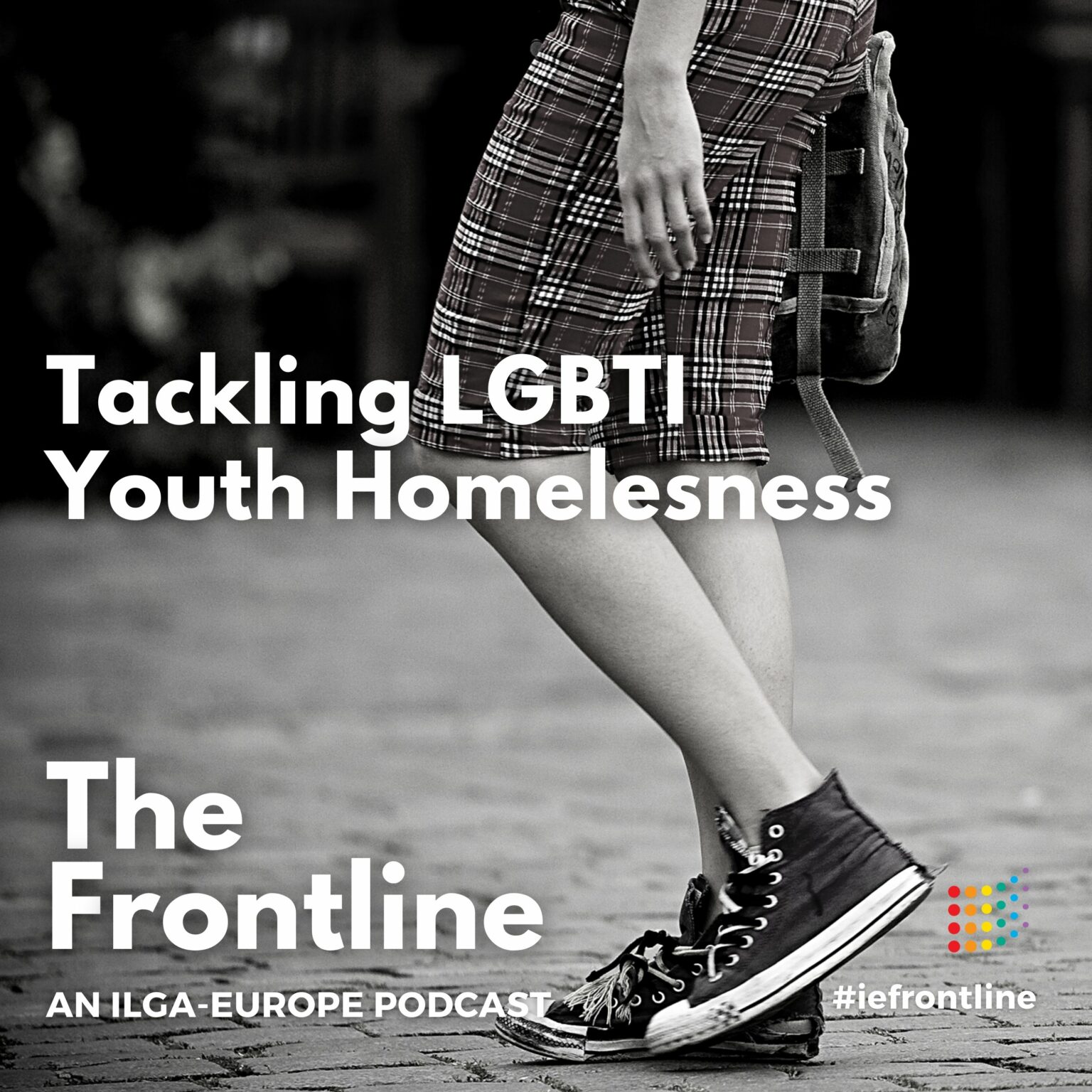
Our 2021 report, in association with Cyndi Lauper’s LGBTIQ Youth Homelessness organisation True Colors United, and the Silberman Centre for Sexuality and Gender (SCSG) at Hunter College in New York, explores the experiences of LGBTIQ focused organisations in Europe working in with young people who have experienced homelessness.
Over 60% of LGBTIQ organisations surveyed for the report said they had worked on the issue. A comparative report from the European Federation of National Organisations Working with the Homeless (FEANTSA), also finds that over 60% of homeless services organisations have dealt with young LGBTIQ people, but often without any training or support.
Our guests for this conversation about the rising issue of young LGBTI people being made homeless in Europe are author of the ILGA-Europe report, Dr Jama Shelton from True Colors United, Policy officer with FEANTSA, Robbie Stakelum, ILGA-Europe’s programmes director, Bjorn Van Roozendaal, and Silvia Magino from Association Quore in Turin, Italy, which has set up a housing project for LGBTIQ people in difficulty.
Listen below or click here to listen and subscribe to The Frontline on your favourite podcast platform.
Survey finds that LGBTIQ organisations and homeless services across Europe are dealing with large numbers of LGBTIQ youth homelessness
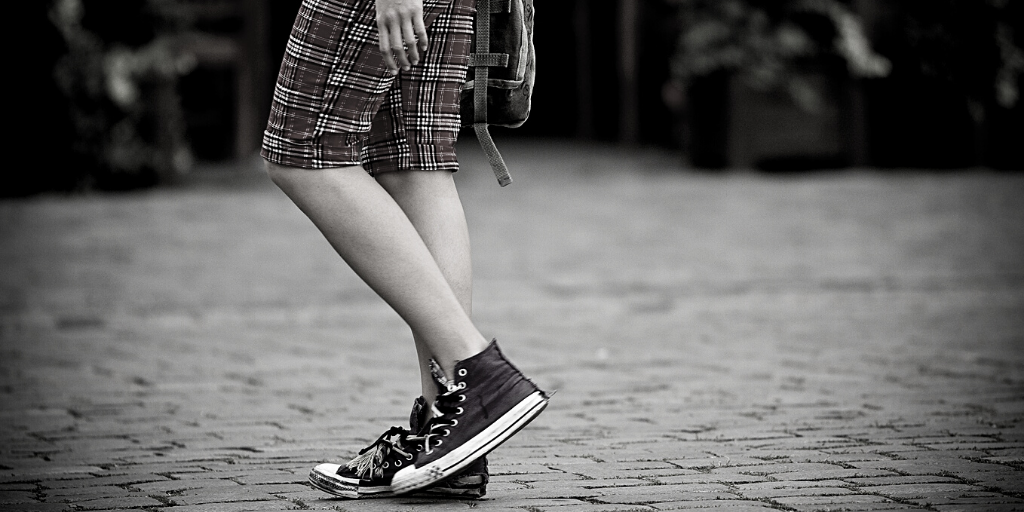
A survey of 71 organisations across 32 European countries finds that over 60% have worked with LGBTIQ youth experiencing homelessness, while homeless services lack the skills and competencies to provide safe and welcoming spaces for LGBTI people.
A report published today, based on a survey by ILGA-Europe in association with the LGBTIQ Youth Homelessness organisation True Colors United, and the Silberman Center for Sexuality and Gender (SCSG) at Hunter College, exploring the experiences of LGBTIQ focused organisations in Europe in working on the issue of LGBTI youth homelessness, points to a large prevalence of LGBTI youth homelessness across Europe, with over 60% of LGBTIQ organisations surveyed saying they have worked with young people who have experienced homelessness.
A comparative report from European Federation of National Organisations Working with the Homeless (FEANTSA) also finds that over 60% of homeless services organisations have dealt with young LGBTIQ people experiencing homelessness but often without any training or support. Nearly three-quarters (72%) of respondents indicated that no national policy exists specifically addressing the issue of LGBTI youth homelessness and over half of respondents (59%) reported a lack of governmental support for programmes that focus on LGBTI youth homelessness, including nearly half (47%) reporting a lack of funding support for such programmes.
The ILGA-Europe survey finds that the most prevalent cause for LGBTIQ youth homelessness is identity-related family conflict, as reported by 71%, while lack of institutional support and social rejection are reported by 44% as a major cause.
Just 17% of respondents said their government supports programmes targeting LGBTI youth homelessness.
According to Evelyne Paradis, Executive Director of ILGA-Europe: “Across the EU, there is a clear gap when it comes to data regarding LGBTI homeless people. And the lack of knowledge leads to a lack of targeted services, with people ending up in the streets. What is needed is for data collection to be stepped up across Europe, to better understand the phenomena. Based on improved knowledge, policy-makers need to work with service providers and LGBTI organisations in developing targeted solutions and support services to ensure LGBTI people are not left behind.”
The purpose of these surveys is to deepen understanding of the needs of LGBTI youth experiencing homelessness, how those needs are being met or not, and the successes and challenges that LGBTI-focused organisations face in working on the issue of LGBTI youth homelessness and in providing LGBTI youth experiencing homelessness with vital assistance.
Over half (56%) of respondents reported their work with LGBTI youth has been affected by the COVID-19 pandemic, with one organisation saying: “We have seen a heightening of the conflict level in domestic environments… Being unable to live their usual double-life and gain the emotional support from other peers who are also LGBTI persons with ethnic minority backgrounds, therefore increases tensions and have increased the risk of exposure among family members.”
Dr. Jama Shelton of True Colors United and Hunter College, said: “Understanding the challenges organisations face when working with LGBTI youth experiencing homelessness is a critical step in developing a comprehensive strategy for addressing the issue.”
The most commonly reported challenges for homeless services to addressing LGBTIQ youth homelessness included the organisation not knowing how to approach the topic of LGBTIQ identities; not being confident in its ability to speak about LGBTIQ issues; and fearing that some LGBTIQ young people will experience violence or abuse in the service setting if their sexual orientation or gender identity is made known.
According to Freek Spinnewijn, Director of FEANTSA: “A clear take away from our research is the need for partnership between our sectors. We need to share our joint expertise to close the existing gap between the homeless and LGBTIQ sectors, which has contributed to the hidden dimension of LGBTIQ homelessness across Europe. Through working together we can provide better and safer services for LGBTIQ youth ”
The ILGA-Europe report provides a baseline of knowledge regarding the experiences of LGBTI-focused organisations in Europe and Central Asia working on the issue of LGBTI youth homelessness. The findings suggest multiple opportunities for resource development, further research, and collaboration.
Evelyne Paradis concluded: “Together with authorities, both the LGBTI and homeless sector have a role to play in combating LGBTI people experiencing homelessness. The intersectional approach to this project is providing the ground-work for cooperation, identifying the scale of the problem and naming key obstacles to supporting LGBTI youth. The global COVID-19 crisis has brought so many vulnerable people in our society into focus, and we cannot look away. It is the responsibility of the European Commission and member states to propose meaningful action on how to tackle the crisis of inequality and to truly include LGBTI people in their measures and policies tackling homelessness.”
Background
Housing instability and homelessness impact LGBTI youth and young adults across the globe. In 2017, True Colors United began working with ILGA-Europe to organize a session on LGBTI youth homelessness at their annual conference, held in Warsaw, Poland. Since that time, the organisations have collaborated to provide workshops at ILGA-Europe’s annual conferences and worked together with The European Federation of National Organisations Working with the Homeless (FEANTSA) to better understand the realities of LGBTI youth homelessness in Europe.
True Colors United, FEANTSA and ILGA-Europe have worked together to create a plan for conducting research that would establish a baseline of understanding about LGBTI youth homelessness across LGBTI focused organisations and inform the development of resources to aid in addressing the challenges that organisations face when working on this critical issue. The survey, developed by ILGA-Europe and True Colors United and in collaboration with the Silberman Center for Sexuality and Gender at Hunter College, is the first step in that process.
Perceptions: Addressing LGBTI Youth Homelessness in Europe and Central Asia
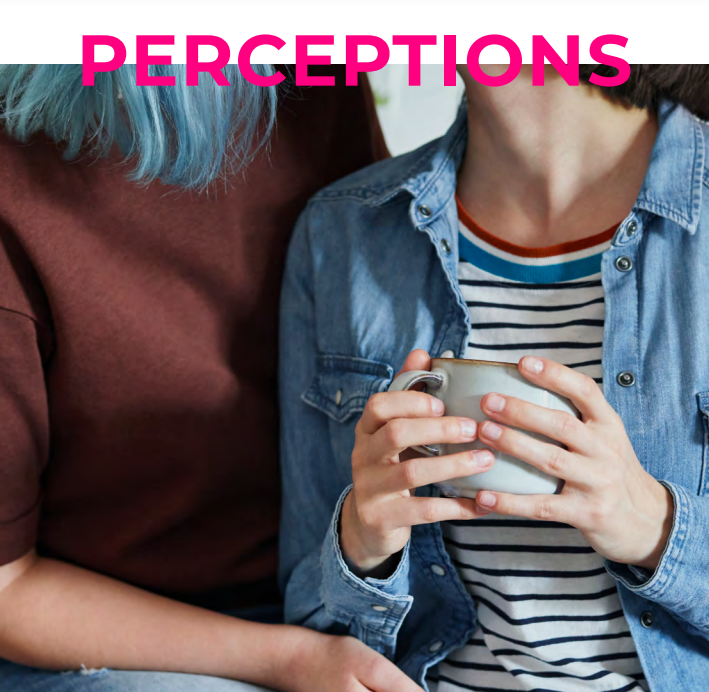
In April 2021, ILGA-Europe in association with the LGBTIQ Youth Homelessness organisation True Colors United, and the Silberman Center for Sexuality and Gender (SCSG) at Hunter College published a report based on a survey exploring the experiences of LGBTIQ focused organisations in Europe in working on the issue of LGBTI youth homelessness. It points to a large prevalence of LGBTI youth homelessness across Europe, with over 60% of LGBTIQ organisations surveyed saying they have worked with young people who have experienced homelessness.
A comparative report from European Federation of National Organisations Working with the Homeless (FEANTSA) also finds that over 60% of homeless services organisations have dealt with young LGBTIQ people experiencing homelessness but often without any training or support. Nearly three-quarters (72%) of respondents indicated that no national policy exists specifically addressing the issue of LGBTI youth homelessness and over half of respondents (59%) reported a lack of governmental support for programmes that focus on LGBTI youth homelessness, including nearly half (47%) reporting a lack of funding support for such programmes.
“Knowledge is Power!” Cyndi Lauper Shows her true colors on LGBTIQ youth homelessness

“We need your help to change the lives of LGBTIQ homeless young people,” says superstar Cyndi Lauper in an exclusive interview about how her organisation, True Colors United, is teaming up with ILGA-Europe to tackle the unacceptable problem of LGBTIQ youth homelessness in Europe.
Since her string of mega-hits in the 80s, from ‘Girls Just Wanna Have Fun’ to ‘I Drove All Night’, Cyndi Lauper has grown from pop ingénue to cultural legend, and along the way she’s secured her place as a timeless queer icon too. She fully became aware of what her music meant to the LGBTIQ community in the years following the release of her 1986 single, ‘True Colors’. The letters she received ever since, about the song helping LGBTIQ people come to terms with themselves, gave shape to her activism. Indeed the song provided the name for the foundation she co-created in 2008 to tackle the problem of LGBTIQ youth homelessness in America, True Colors United.
Now True Colors United is teaming up with ILGA-Europe to help tackle the growing problem of LGBTIQ youth homelessness in Europe and Central Asia, and the first step is to get the real picture from LGBTIQ organisations on their experiences in dealing with the issue.
Here, Cyndi tells us the reasons she’s so passionate about coming to a time when no young LGBTIQ person finds themselves without a home, and just why it’s so important that LGBTIQ organisations across Europe and Central Asia help lead the way.
Hi Cyndi, and thank you for joining us! It’s hard to believe that it’s 12 years since you co-founded True Colors United. What moved you to set the organisation up?
I am a friend and family of the LGBTIQ community and from where I come from you stand up for your family and friends when they are under attack. I am also a parent and someone who experienced homelessness when I was young. When I learned that up to 40 per cent of youth and young adults experiencing homelessness in America were LGBTIQ, I had to step up and do something. Having a safe and stable place to call home is a basic human right and to be denied that because of who you are is unacceptable. We are better than this, especially when youth homelessness is a fixable problem.
What do LGBTIQ young people experiencing homelessness in the US and Europe have in common?
While we do know some things that young people have in common, we have more questions than answers about the experiences of LGBTIQ youth and homelessness in Europe. That is why this survey is so important. We do know that LGBTIQ youth in both the US and Europe experience homelessness at higher rates than non-LGBTIQ youth and that family conflict is a key factor… but there are still many questions about what the barriers are for LGBTIQ youth getting the help and support they need in Europe, why they are experiencing homelessness beyond family conflict, what their experiences are while they are homeless and seeking the support they need, and most importantly, what young people themselves say they need.
How do you think homelessness, and specifically homelessness in young LGBTIQ people, can be stopped?
First and foremost, we need to work with LGBTIQ+ young people who have experienced homelessness to come up with and put the solutions in place that will work. LGBTIQ+ youth are the experts of their own experiences, we need to listen to and work with them. It is essential. We also need to ensure that any support and help they seek is safe, welcoming and inclusive.
And, we need more data… we need information. We need to understand the scope of the problem and the barriers that keep service providers, communities, and countries from addressing the issue. Eight years ago in America, we had hardly any data. Then we did the same type of survey we are asking your members to fill out now. It fundamentally changed things… we finally had some strong information to convince communities and our government to put funding, programs and policies in place to really start fixing the problem and ensuring LGBTIQ youth get the help they deserve.
More research followed and we now have more data than we have ever had before and more support for youth experiencing homelessness. While we still have a long way to go, we have also come a long way and it all started with having information.
In what ways can the work of LGBTIQ organisations help young people experiencing homelessness?
LGBTIQ+ organisations are key drivers of change for the community around the globe and they are important leaders in ending LGBTIQ youth homelessness in Europe. Whether it is providing direct services, like housing and counseling, or advocating for policies, funding, and programs from their governments, LGBTIQ organisations play a crucial role.
Another way is through helping to train those programs serving youth who are experiencing homelessness in their countries (if they exist) to be safe and inclusive, and build partnerships with those organisations to ensure that LGBTIQ youth are getting the help they need. There is no shortage of things that LGBTIQ organisations can do and the survey will help identify some additional ways they can take part.
Why do you think research can change the lives of LGBTIQ homeless young people?
Knowledge is power! If we do not understand the true scope, causes, and impact of LGBTIQ+ youth homelessness, we cannot fully support young people and figure out what is working and what is not working in ending the problem.
What would you say to the organisations filling this survey?
I know you have so much you are dealing with right now, especially in light of the pandemic, but I can promise you that change will happen if you take the time to fill out the survey. We will all have the information we need to start making a greater difference. I speak from experience. If the 400 organisations in America did not fill out the survey we did in 2012, and again in 2015, we would not have been able to make the progress we have been able to make so far there.
LGBTIQ and Homeless: One Young Person’s Story
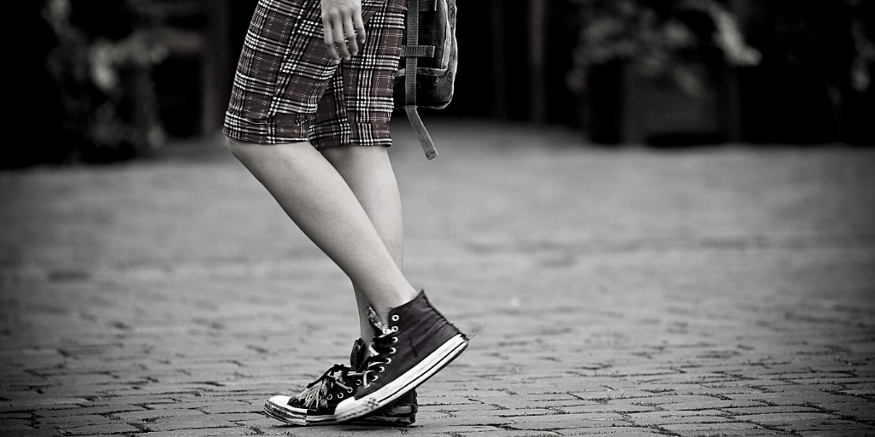
Young LGBTIQ people are being made homeless every day in Europe. To tie in with our survey for LGBTIQ organisations about their experience of youth homelessness, a young person from Slovenia tells their story of self-discovery, and how bullying in their family forced them to run away.
became homeless at the age of 18. At the time, I was living in Ljubljana, the capital city of Slovenia, with my parents and two older brothers. I was going to tourism and culinary school, but it was not my passion. For as long as I can remember, my passion has been art and music, but my family didn’t accept that.
My mother is a hard-working woman who took care of all four of us, especially the men in the family. She worked as a waitress and after work she immediately came home to cook and clean. I always felt sorry for her; I still do. She was never complimented by my father, who beat her up often, and put her down.
My father is an alcoholic in denial. He eats pork and never goes to the Mosque, but always proudly calls himself a man of faith. He had a hard life as a child. His own father was a cold-blooded dictator of a family that left when war started in Yugoslavia. My father ended up in the military. He was just 18 when he had his first child. I’m not trying to make excuses for his actions, but I guess I comfort myself with these facts; the reasons why he turned into an alcoholic bully.
“I didn’t really fight back. I just tried to get away.”
One day, I came home from the city to find my father was brutally drunk. He started yelling at me, shaming my appearance and shouting things like: ‘’Look, you slut, even if you are 18 now, while you are living under my roof, you can’t go out anytime you like. You should stay at home, cook and clean for me!”
I tried to leave the room, but he wouldn’t let me. In his mind, leaving a room in the middle of the fight is a disrespectful thing to do. So, for the first time he got physically aggressive towards me. I didn’t really fight back; I just tried to get away.
I opened the window and yelled at the top of my lungs for help. Of course, the neighbors didn’t react. I guess over the years they got used to the screaming from when my mom was being beaten up. My father pushed me away from the window and closed it. He started laughing at me, as if to say, ‘no one is coming to help you’.
At that moment I got really scared. I grabbed the first thing I saw. It was this heavy glass candy bowl on the dining table. I aimed it towards his head, but I couldn’t throw it at him. The next thing I remember, I was lying on the floor covered in blood.
All the time he had been letting out his anger on me, I was still holding the glass bowl. It eventually broke and cut my arm badly.
For the record, my mother was present during all this time. She was cleaning the dishes and just being quiet. When she saw my cut, she said to my father, “You can stop now. Her arm is bleeding too much.”
I immediately picked myself up and ran towards the door. Before I stepped outside I told my mom how disappointed I was and asked her how could she let this happen? I ran barefoot out of the apartment, seeking help. A stranger passing by noticed me. She took me to the nearest hospital where I got the blood cleaned off my face and body, and a few stitches in my arm. The nurses wanted to know how I got my injuries. I was afraid to tell them, because at that time I saw my father as somebody who was stronger than the law. I eventually explained everything to them under the condition that they wouldn’t call the police, although in Slovenia there’s a law that states that if a medical operative receives a patient who was abused by a family member, they are obliged to report it.
“When I arrived at the LGBT+ camp, I was still feeling very vulnerable.”
Later that night I went to sleep at one of my friends’ houses. Her parents understood the situation but still encouraged me to go back home. I didn’t feel that was a safe thing to do, so I called another friend and asked if I could stay at their place for a while. They explained that they were leaving for an LGBT+ camp that day, and said that I should come with them because I could sleep and eat there for free. I only needed 20 euro for the bus ticket.
At first I hesitated a bit because I wasn’t anywhere on the LGBT+ spectrum and I felt like I don’t belong there. I didn’t want to invade people’s space. But my friend convinced me to go. I called my mother and asked her for the bus fare, explaining that I would be gone for a couple of days because I needed some space from my father.
When I arrived at the LGBT+ camp, I was still feeling very vulnerable, crying a lot and trying to forget about everything that happened at home. The people there were all very welcoming. They asked me all sorts of questions, things I had never asked myself before and it made me feel important.
We all sat in a circle and the first workshop started, an introduction to the camp, explaining the rules, schedule and introducing ourselves. It sounds crazy, but I felt safer sitting in this circle than I had in my entire life. I remember looking around the room and admiring all these people. I was wondering about their pasts. How did they get here? Where were they going after camp? Could we be friends? Would they judge me because I wasn’t like them?
After the workshop, I went to get some tea. One guy from my room joined me and we were making small talk. “Oh, I see that you have a bandage on your palm,” he said. “What happened?” I lied about being clumsy. I was ashamed of what had really happened.. I couldn’t go ahead and say: “I’m actually at this camp because I don’t feel safe at home”.
We kept on talking and at one point my new roommate asked: “What’s your sexual orientation?”
“Something in my soul clicked.”
I felt really stupid not knowing what that actually meant. He politely explained, asking, “Well, who do you prefer, in a romantic or sexual way. Do you prefer guys, girls, maybe both?”
I remember thinking: “Shit. Now Is the moment when people start realising I am the only straight one here, but I still gave an honest answer.
“Well, I had two boyfriends. And I kissed a few of my female friends. But we were just messing around.”
“So you are bisexual?”
Again, I wasn’t sure what that meant.
“You know, you like boys and girls,” he explained.
“Oh, no,” I protested. “You misunderstood me. I like boys. Yes, I kissed some girls, but I didn’t feel anything romantic towards them.”
Later on that night I got the chance to be alone with my thoughts. Something in my soul clicked and explained the parts of me that I never really understood: I realised that I was somewhere on the queer spectrum and that I always had been. The only thing that was stopping me from understanding this before now was that I never had a safe space before. My family was homophobic and I was so scared of that, I had never let myself even think about the possibility of being queer.
I will not tell you about all the details of my life after that. Not because I don’t want to share it, or because it’s not important. It’s just too much to explain. But coming out to myself was both the best and worst thing that ever happened to me. It was like a long-missing piece of a puzzle had been finally put in place and soon my self-confidence began to grow. At the same time I knew that being queer, a lot of my privileges were going to disappear. And the worst part was losing a lot of friends and family members because of it.
“I was forced to run away from home.”
Two weeks after the LGBT+ camp, I was forced to run away from my home. The bullying in my family didn’t stop, so it was only logical that I couldn’t live with them anymore. I was queer, and they would kick me out sooner or later. After that, I was living illegally in student dorms with my friends. Then I went to a homeless crisis center and then a safe house. I was basically moving a lot, until I found a job and settled in a new home with a gay couple.
When I think back on my emotional effect of being queer and homeless, I can say that I’m grateful for all the bad days because it got me to the point where I am now. Of course, my mental health suffered. I always felt like a burden to people because I had nowhere else to go and sleep. At the same time I was fighting with my internalised homophobia. On the other hand, I never felt more free. I was always surrounded by kind and accepting people. The LGBT+ community helped me a lot with everything, with mental support, finding a job and finally, finding a safe home.
For all the love and support I’ve received, I am forever grateful.
Major survey on LGBTIQ youth homelessness in Europe launched
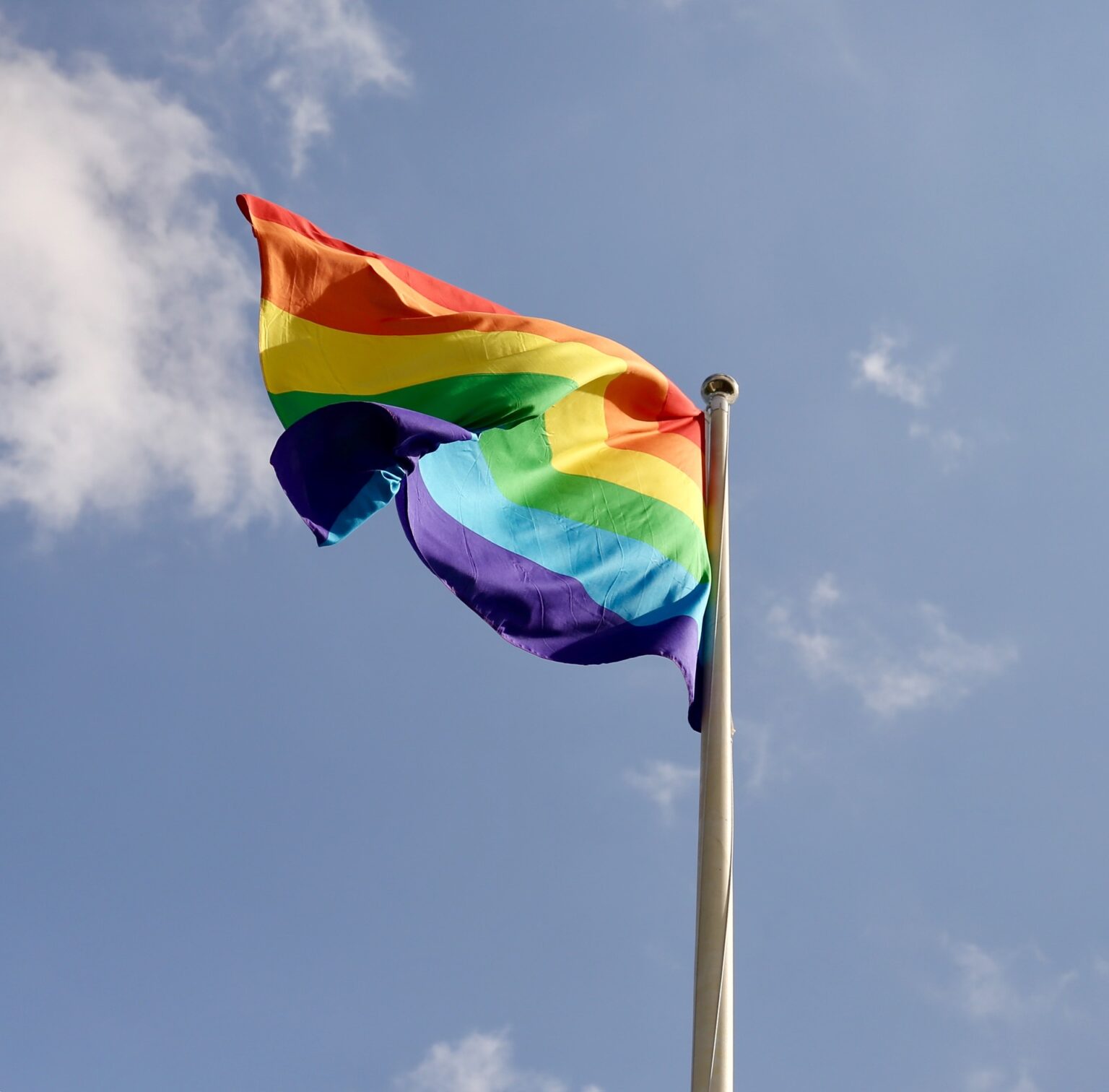
A new survey aims to guage the experiences of European and Central Asian groups and organisations when it comes to LGBTIQ youth homelessness.
Young LGBTIQ people are experiencing homeless every day, often rejected by parents, families and society because of their sexuality or gender identities. Yet, this is a much under-addressed issue in the European and Central-Asian region.
ILGA-Europe are partnering with key actors in the sector to raise awareness, increase collective knowledge and ultimately explore potential avenues for responses from the LGBTI movement to the problem. These partners include the international LGBTIQ youth homelessness organisation, True Colors United, the European Federation of National Organisations Working with the Homeless (FEANTSA) and the Silberman School of Social Work at the City University of New York.
Today, ILGA-Europe, in association with these partners, launch a survey to hear from LGBTIQ groups and organisations what their experience is when it comes to LGBTIQ youth homelessness, what initiatives they have taken, and most of all, what more is needed to further engage in such work.
This is part of ILGA-Europe’s broader effort to mobilise interest, knowledge and resources to tackle LGBTIQ youth homelessness in Europe and Central Asia. By taking this survey organisations will help ILGA-Europe in advocating for more resources and policies, in providing tools, developing knowledge, and bringing expertise to meet the needs of LGBTIQ young people who have become, or are at risk of becoming homeless.
According to Evelyne Paradis, Executive Director at ILGA-Europe: “By taking this survey, LGBTIQ organisations can help us do much needed work with our partners to address the issue of LGBTIQ youth homelessness in Europe and Central Asia. Knowledge of their experiences in addressing homelessness will inform our work with governments and funders, so that one day no young LGBTIQ person finds themselves without a home.”
The survey can be found here, and it takes approximately 15 minutes to complete.
Join webinar on LGBTIQ youth homelessness and the role of LGBTIQ organisations
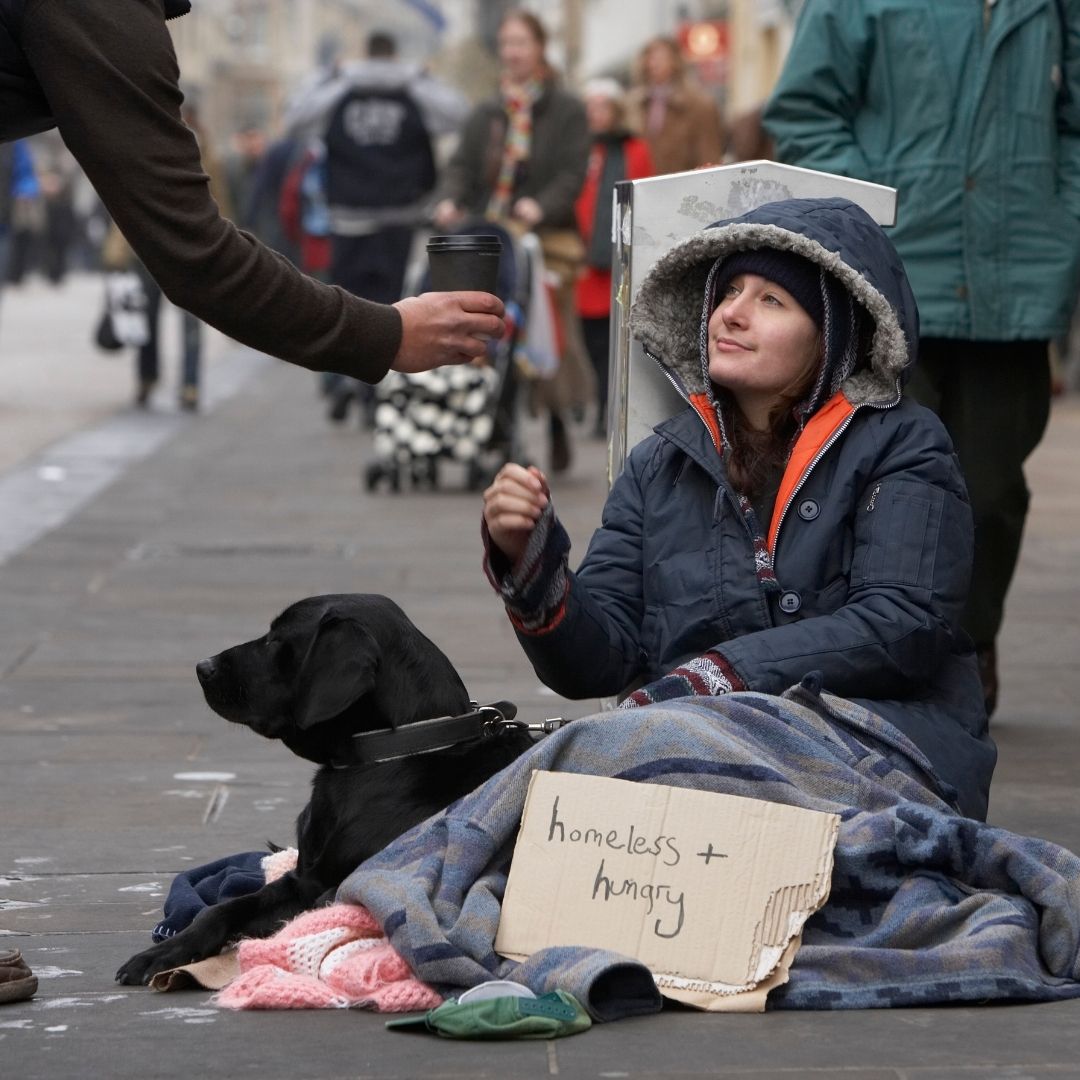
Join us for the webinar An introduction to LGBTIQ youth homelessness and the role of LGBTIQ organisations on 27 September 2019 at 13.00 CEST.
LGBTIQ homelessness is a much under addressed issue in the European and Central-Asian region, a reality that needs to change.
As part of our intersectionality work and in an effort to address socio-economic inequalities and their impact on LGBTIQ people, ILGA-Europe are increasingly engaging around the issue, and more specifically on LGBTIQ youth homelessness.
By partnering with key actors in the sector and creating spaces for peer learning and exchange, we want to raise awareness, increase our collective knowledge and ultimately explore potential avenues for responses from the LGBTIQ movement.
During this webinar we will hear from three partners and friends of ILGA-Europe: FEANTSA, European Federation of National Organisations Working with the Homeless; Ljubljana Pride Association, active at the grassroots level in Slovenia specifically on youth LGBTIQ homelessness; and True Colors United, US based organisation implementing innovative solutions to youth homelessness that focus on the unique experiences of LGBTIQ young people.
What does the issue look like? What are challenges around service provision and what can LGBTIQ organisations and groups do? What are pressing needs and what are examples of tools, resources and strategies available?
Our guests will touch upon these elements to provide an introduction to LGBTIQ youth homelessness and to reflect on what role LGBTIQ organisations and groups can play.
Registration
Registration is now closed.
Presenters
Simona Mursec is the President of Ljubljana Pride Association since 2015. In her 20 year long career as an activist, youth political representative, human rights education trainer and facilitator of policy processes she has worked with numerous international and interregional institutions and NGOs from all over the globe. She is a fierce human rights advocate and practitioner and her main fields of interest are rights of minorities and marginalised groups, youth and youth policy processes, social inclusion and antiracism work. Ljubljana Pride Association has developed into a strong intersectional and anti-racist organisation under her auspices and leadership. Simona is currently employed at WeMove Europe, a European multi-issue online campaigning organisation, where she works as their finance manager.
Robbie Stakelum works for FEANTSA, the EU Umbrella Group of Homeless Organisations, and leads on their work on LGBTIQ & youth homelessness, where he also coordinates a network of young professionals working towards the eradication of youth homelessness in Europe. He is a Course Director with the Council of Europe delivering the upcoming 5 day course on LGBTIQ homelessness in Budapest and also works as a professional and life coach.
Gregory Lewis – A longtime advocate for lesbian, gay, bisexual, transgender, queer, and questioning (LGBTQ) equity, Gregory Lewis worked with Cyndi Lauper to launch True Colors United in 2008 and has served as its executive director since its founding. Under Gregory’s leadership, True Colors United has grown into the leading national organization implementing innovative solutions to address youth homelessness by focusing on the unique experiences of LGBTQ youth. Gregory built the organization from the ground up, creating the infrastructure and development streams critical to its success. Gregory also served as an inaugural co-chair for four years of A Way Home America, a national initiative to build the movement to prevent and end homelessness among young people in the United States.